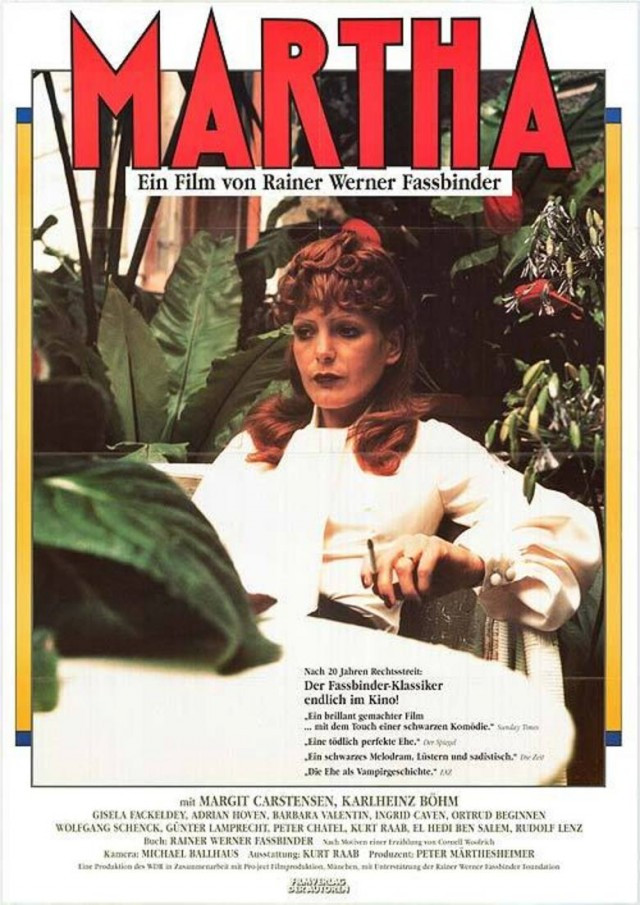
MARTHA (TV)
(director/writer: Rainer Werner Fassbinder; screenwriter: from a story by Cornell Woolrich; cinematographer: Michael Ballhaus; editor: Liesgret Schmitt-Klink; music: Gaetano Donizetti/Orlando di Lasso; cast: Margit Carstensen (Martha Heyer/Salomon), Karlheinz Böhm (Helmut Salomon), Barbara Valentin (Marianne), Peter Chatel (Kaiser), Gisela Fackeldey (Martha’s Mother), Adrian Hoven (Martha’s Father), Ortrud Beginnen (Erna), Kurt Raab (Embassy Secretary), Ingrid Caven (Ilse), El Hedi ben Salem (Hotel guest), Wolfgang Schenck (Library Boss. Meisler), Günter Lamprecht (Dr. Salomon); Runtime: 116; MPAA Rating: NR; producer: Peter Märthesheimer; Fantoma; 1974–West Germany-in German with English subtitles)
“Acerbic black satire of a bourgeois marriage.”
Reviewed by Dennis Schwartz
Writer-director Rainer Werner Fassbinder’s acerbic black satire of a bourgeois marriage, made for German TV, is built around a sado-masochistic relationship with the male dominating; in its most searing moments it shows a contempt for the bourgeois by making a political statement through one such couple and their questionable loving relationship while comparing them to the everyday repressive society in modern Germany. It takes us into the director’s darkest recesses that walks the thin line from comic/tragedy to a psychological horror tale.
It’s based on a story by Cornell Woolrich; the Technicolor film is elegantly photographed by Michael Ballhaus. Homage is paid to Douglas Sirk (“All That Heaven Allows”), the German émigré director who greatly influenced Fassbinder, by having the heroine’s address be at “Douglas Sirk Street” and by having the title character named after Martha Hyer (appeared in Sirk’s 1956 Battle Hymn).
The film opens with 31-year-old librarian virgin spinster Martha Heyer (Margit Carstensen) in her Rome hotel as a black man (El Hedi ben Salem) quietly enters her room without her knowledge and starts peeling off his clothes, but who leaves immediately when ordered out. Later the desk clerk explains he sent him up when he noticed she winked at him. Martha’s on holiday with her overbearing but much adored father (Adrian Hoven), but the holiday comes to an abrupt end when her dad has a fatal heart attack on the Spanish Steps and her purse is stolen by the Libyan from the hotel who followed her. She cries only after the purse is stolen. Back in Germany she turns down a marriage proposal from her library boss (Wolfgang Schenck), who promptly asks her co-worker (Ortrud Beginnen) and she accepts because he will be a good provider and is a decent sort (mocked as the perfect reason for the bourgeois to marry). At a formal dinner-party to announce the wedding of her friend Ilse (Ingrid Caven) to Dr. Salomon, Martha meets the groom’s handsome brother Helmut (Karlheinz Böhm, brilliant star of Peeping Tom), a wealthy bridge and dam engineer, and she marries the sexually demanding heartthrob when her troubled overbearing mother (Gisela Fackeldey) overdoses on tranquilizers and is placed in a mental institution (the price of her new freedom). Hubby turns out to be an overbearing sadist who subjects Martha to a constant barrage of mental and physical abuse. On their honeymoon he has rough sex with her after she’s suffering from a severe sunburn. At home he subjects her to a number of escalating demands such as insisting they live in a house where a murder was committed and where she can’t stand the furnishings, handing in her resignation for a job she loves without her permission, making her read a dry book about civil-engineering so they can talk about his work and insisting she only listen to the record he gives her of Orlando di Lasso because it’s the kind of music she should be listening to. His bullying escalates as she comes completely under his control and he places her under a voluntary house arrest. When she’s discovered outside, she fears for her life and convinces her librarian confidant (Peter Chatel) to drive her away, but in her panic she causes a car crash when she mistakenly thinks her hubby is following and the innocent love sick guy dies and she gets paralyzed. As reported by Jonathan Rosenbaum in the liner notes to the DVD, Fassbinder called it a happy ending because she achieves absolute fulfillment now that she’s completely enslaved while Carstensen, who gave a superb performance, the best of her career, vehemently differs, saying it culminated in a tragedy that indicated how far her character had fallen. As for me, I thought the Carstensen character had some big-time psychological issues that outweighed her dutiful bourgeois wife role. After a certain point the film stopped being a film and became a test on how the viewer looked upon the Carstensen character as a real-life person, and I would imagine there are many ways to look at it.
It takes the Sirk woman’s weepie pic to new extremes and brings high camp to a sado-masochistic relationship that only those in such a squeeze know how much they enjoy it and how much it consumes them, while it must be disturbing to even the most mundane couple, all things considered, as the battle of the sexes (usually featuring one more dominant mate) is always there to some degree in every relationship though, I would think, rarely as extreme as in this marriage.
REVIEWED ON 5/25/2006 GRADE: A